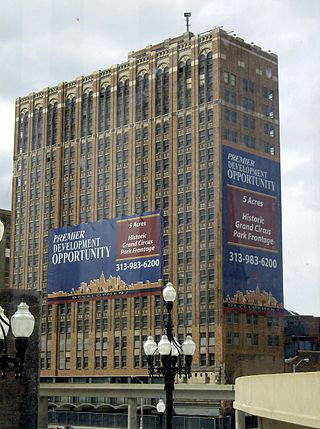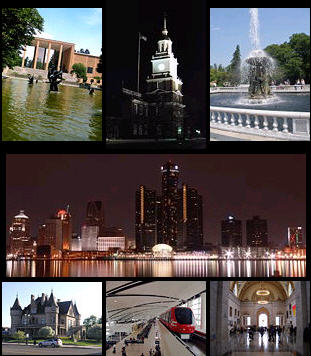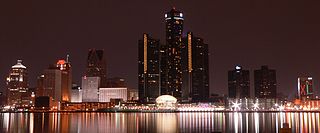
Detroit is the most populous city in the U.S. state of Michigan. It is the largest U.S. city on the United States–Canada border, and the seat of government of Wayne County. Detroit had a population of 639,111 at the 2020 census, making it the 29th-most populous city in the United States. The Metro Detroit area, home to 4.3 million people, is the second-largest in the Midwest after the Chicago metropolitan area and the 14th-largest in the United States. A significant cultural center, Detroit is known for its contributions to music, art, architecture and design, in addition to its historical automotive background.

Corktown is a neighborhood located in Detroit, Michigan. It is the oldest extant neighborhood in the city. The current boundaries of the district include I-75 to the north, the John C. Lodge Freeway to the east, Bagley and Porter streets to the south, and Rosa Parks Boulevard to the west. The neighborhood was listed on the National Register of Historic Places in 1978.

Michael Ilitch Sr., also known as Mr. I, was an American entrepreneur and restaurateur who served as the founder and owner of the international fast food franchise Little Caesars Pizza. He also owned the Detroit Red Wings of the National Hockey League and Detroit Tigers of Major League Baseball.

The Renaissance Center, commonly known as the RenCen, is a complex of seven connected skyscrapers in downtown Detroit, Michigan, United States. The Renaissance Center complex is on the Detroit International Riverfront and is owned and used by General Motors as its world headquarters. The central tower has been the tallest building in Michigan since its completion in 1977.
Marian Bayoff Ilitch is an American billionaire businesswoman, and the co-founder of Little Caesars Pizza with her late husband, Mike Ilitch. As of March 2018, Ilitch was one of the world's seven richest women, according to Bloomberg.

Ilitch Holdings, Inc. is an American holding company established in 1999 to provide all companies owned by Mike and Marian Ilitch with professional and technical services. Its privately held businesses include Little Caesars Pizza, the National Hockey League (NHL) Detroit Red Wings, the Major League Baseball (MLB) Detroit Tigers, Olympia Entertainment, Olympia Development, Olympia Parking, Blue Line Foodservice Distribution, Champion Foods, 313 Presents, the Little Caesars Pizza Kit Fundraising Program, Hockeytown Cafe, and a variety of venues within these entities. Ilitch Holdings subsidiaries manage Detroit's Fox Theatre, City Theatre, Comerica Park, Pine Knob Music Theatre, Michigan Lottery Amphitheater, Meadow Brook Amphitheater, and Little Caesars Arena, which replaced Joe Louis Arena after closing in July 2017.
Christopher Paul Ilitch is president and chief executive officer (CEO) of Ilitch Holdings, Inc., a holding company that provides services to businesses that were founded or purchased by his parents, Mike and Marian Ilitch. Ilitch companies include Little Caesars Pizza, Olympia Entertainment, MotorCity Casino Hotel, the Detroit Tigers of Major League Baseball, the Detroit Red Wings of the National Hockey League, and numerous real estate holdings. In 2018, the organization's total combined revenue was $3.8 billion.
Tom Gores is an American billionaire businessman. He is the founder of Platinum Equity, a private equity firm headquartered in Beverly Hills, California. In June 2011, Gores and Platinum Equity became the owners of the National Basketball Association's Detroit Pistons. He became the sole owner in 2015. As of March 2022, his net worth was estimated at $6 billion.

The Cadillac Tower is a 40-story, 133.4 m (438 ft) Neo-Gothic skyscraper designed by the architectural firm of Bonnah & Chaffee at 65 Cadillac Square in downtown Detroit, Michigan. The building's materials include terra cotta and brick. It was built in 1927 as Barlum Tower. At the top of the tower is a tall guyed mast for local radio stations WMXD, WLLZ and television station WLPC-CD. It was listed on the National Register of Historic Places in 2005.

The Detroit Free Press Building is an office building designed by Albert Kahn Associates in downtown Detroit, Michigan. Construction began in 1924 and was completed in 1925.

The United Artists Theatre Building is a vacant high-rise tower in downtown Detroit, Michigan, standing at 150 Bagley Avenue. It was built in 1928 and stands 18 stories tall. The building was designed by architect C. Howard Crane in the renaissance revival architectural style, and is made mainly of brick. Until December 29, 1971, it was a first-run movie house and office space, and then after that, the theatre saw sporadic usage until 1973. The United Artists Theatre, designed in a Spanish-Gothic design, sat 2,070 people, and after closing served from 1978 to 1983 as the Detroit Symphony Orchestra's recording theater. After the theater closed, the office block struggled as tenants moved to suburbs. It finally closed in 1984. An original 10-story, vertical UA sign was replaced in the 1950s with a marquee that remained until 2005. The building once shared a lot with the now demolished Hotel Tuller.

Downtown Detroit is the central business district and a residential area of the city of Detroit, Michigan, United States. Locally, downtown tends to refer to the 1.4 square mile region bordered by M-10 to the west, Interstate 75 to the north, I-375 to the east, and the Detroit River to the south. Although, it may also refer to the Greater Downtown area, a 7.2 square mile region that includes surrounding neighborhoods such as Midtown, Corktown, Rivertown, and Woodbridge.

Tourism in metropolitan Detroit, Michigan is a significant factor for the region's culture and for its economy, comprising nine percent of the area's two million jobs. About 19 million people visit Metro Detroit spending an estimated 6 billion in 2019. In 2009, this number was about 15.9 million people, spending an estimated $4.8 billion. Detroit is one of the largest American cities and metropolitan regions to offer casino resort hotels. Leading multi-day events throughout Metro Detroit draw crowds of hundreds of thousands to over three million people. More than fifteen million people cross the highly traveled nexus of the Ambassador Bridge and the Detroit-Windsor Tunnel annually. Detroit is at the center of an emerging Great Lakes Megalopolis. An estimated 46 million people live within a 300-mile (480 km) radius of Metro Detroit.

The metropolitan area surrounding and including Detroit, Michigan, is a ten-county area with a population of over 5.9 million, a workforce of 2.6 million, and about 347,000 businesses. Detroit's six-county Metropolitan Statistical Area has a population of about 4.3 million, a workforce of about 2.1 million, and a gross metropolitan product of $200.9 billion. Detroit's urban area has a population of 3.9 million. A 2005 PricewaterhouseCoopers study estimated that Detroit's urban area had a gross domestic product of $203 billion.

The Detroit International Riverfront is a tourist attraction and landmark of Detroit, Michigan, extending from the Ambassador Bridge in the west to Belle Isle in the east, for a total of 5.5 miles along the Detroit River. The International Riverfront encompasses a cruise ship passenger terminal and dock, a marina, a multitude of parks, restaurants, retail shops, skyscrapers, and high rise residential areas along with Huntington Place. The Marriott at the Renaissance Center and the Robert's Riverwalk Hotel are also situated along the International Riverfront. Private companies and foundations together with the city, state, and federal government have contributed several hundred million dollars toward the riverfront development. Key public spaces in the International Riverfront, such as the RiverWalk, Dequindre Cut Greenway and Trail, William G. Milliken State Park and Harbor, and a cruise ship passenger terminal and dock at Hart Plaza complement the architecture of the area. The area provides a venue for a variety of annual events and festivals including the Detroit Electronic Music Festival, Detroit Free Press International Marathon, the Detroit International Jazz Festival, Motor City Pride, the North American International Auto Show, River Days and Detroit China Festival. In February 2021, the Detroit International Riverfront was voted best riverwalk in the United States by USA Today readers. It was selected a second time as the best riverwalk in the U.S. in 2022.
Planning and development in Detroit since the late 20th century has attempted to enhance the economy and quality of life of Detroit, Michigan, United States. In 1970, the private group Detroit Renaissance began to facilitate development in the city. Its successor, Business Leaders for Michigan, has continued to facilitate development into the 21st century. Projects have included new commercial facilities, revitalization of neighborhoods, hospitality infrastructure, and improvements to recreational and public facilities, such as the QLine light rail project.

The Eddystone Building is an apartment building and former hotel located in Midtown Detroit, Michigan, at 100-118 Sproat Street. It was listed on the National Register of Historic Places in 2006.
Novi Town Center is an open-air shopping center located at Novi Road and Grand River in Novi, Michigan, USA, in Metro Detroit. Owned by CBRE, the center is on Interstate 96, with the Twelve Oaks Mall on the other side of the road.

Little Caesars Arena is a multi-purpose arena in Midtown Detroit. Opened on September 5, 2017, the arena, which cost $862.9 million to construct, replaced Joe Louis Arena and The Palace of Auburn Hills as the home of the Detroit Red Wings of the National Hockey League (NHL) and the Detroit Pistons of the National Basketball Association (NBA), respectively.
Hamilton Anderson Associates (HAA) is a Detroit-based, multi-disciplinary design firm founded in 1994 dedicated to improving the built environment through creative, contemporary design. HAA was founded by Rainy Hamilton Jr. and Kent Anderson, who developed the business of integrating architecture and site design as the basis of producing urban design solutions, including architecture, landscape architecture, planning, interiors and urban design. Located in Paradise Valley in downtown Detroit, HAA is one of the largest African-American owned architectural firms in the United States.












